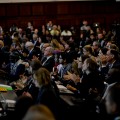Farming, a non-Doha Issue
Gab Donohue | December 6, 2012.

The days of farmers worrying about a surplus of food are over where farmers living with shortages is now the norm.
“It’s an exciting time to be a farmer,” Robert Carlson, president of the World Farmers’ Organisation told those in Doha, Qatar. Increasing population rates means a decrease in access to finite resources – leaving farmers with both concerns and opportunities.
220,000 people are added to the global dinner table daily – that’s the entire population of Rome every 16 days.
“When a farmer wakes up in the morning, he isn’t bothered by what is going on in the world, what he needs to know is how can he deal with the factors that are affecting his farm. So, we need to equip him with all the knowledge and technologies to help him deal with climate change challenges.”
Dealing with emissions reduction targets has been a hard task in Doha, but Dr Mahmoud Solh, director general of the International Centre for Agricultural Research in the Dry Areas, believes that governments have already failed by excluding agricultural matters.
“If we do not put agriculture on the agenda it is a waste. Agriculture is the backbone for food security and improving livelihood of the poor.”
Solh spoke of the need for investment in science-based agriculture research and technology transfer to increase productivity and assist communities vulnerable to weather extremes.
Carlson is concerned about progress in Doha, and beyond given “This tendency we humans have to not deal with a crisis until it is a crisis. We may do all kinds of harmful things to the environment… in this desperation to fill a short-term need for food. That is where the trade-off is potentially disastrous, if we don’t plan ahead.”
By Gabrielle Donohue, photo by Laura Owsianka.











comment